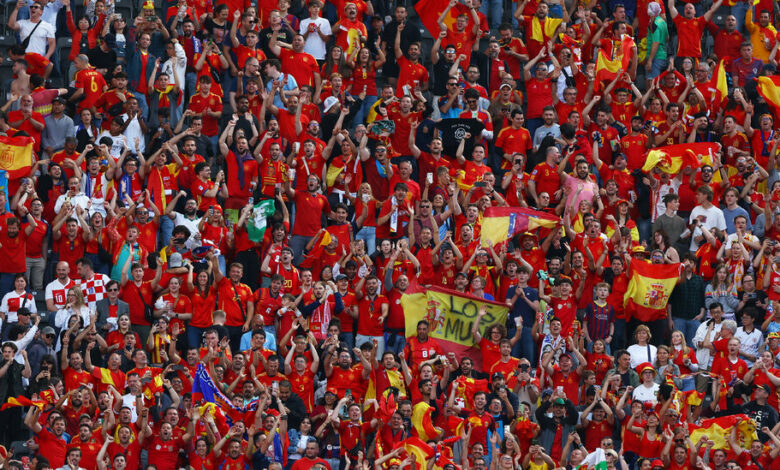In the Basque Country: muted cheers for the Spanish football team

Miguel Martínez didn’t quite know how to respond. On Monday evening, he stood outside a bar in Bilbao, listening to his colleagues’ conversations, his eyes glued to a television screen inside. He has been closely following Spain’s progress in the European Football Championship, he said, and a work trip would not get in his way.
He had watched the country’s first two games with his 13-year-old son at home in Seville. The city, he said, has caught a heavy dose of tournament fever, a condition that reliably sweeps across Europe every two years. Balconies are festooned with Spanish flags. Streets are alive with Spanish jerseys. Spain’s victories have sparked wild celebrations.
But as far as Mr Martínez could see, Bilbao was somehow immune. There were plenty of flags hanging from the balconies, but they represented Palestine, or Pride, or, more often, the Basque Country itself, in the form of the region’s traditional Ikurriña. The Spanish flag flew from only a handful of official buildings.
Mr Martínez knew very well why that was so. The Basque Country, a mountainous region in northern Spain that hugs the Bay of Biscay and the Pyrenees, has long considered itself distinct from the rest of the country. It has its own language, culture and identity. The Basque struggle for autonomy, even independence, has long and bloody roots.
He was therefore keen to show respect for his hosts and not to offend. When Spain scored early in the third group match, a meeting with Albania, he and his colleagues responded with a brief, muted cheer – little more than an exhalation, rather than the joyful abandon they might have shown in Seville.
“It’s probably better to be a little bit discreet,” he said. “I don’t know what people think about the national team here.”
For years, his fears would have been well-founded. Although Spain played their first ever home game at San Mames, the home stadium of Athletic Club, Bilbao’s fervently supported local team in 1921the men’s national team has not visited the city since 1967, seemingly an acknowledgment that it was not safe ground during the years when ETA, the Basque separatist group, was active.
In 2014, when it was announced that Bilbao would be a candidate to host several matches at the 2020 European Championship – including three earmarked as Spain’s ‘home matches’ – a leading Basque politician suggested that such an idea would inevitably end with “tanks on the street.”
Ultimately, the coronavirus pandemic saw Bilbao relieved of its hosting role and replaced by Sevilla when the postponed tournament eventually went ahead.
The suspicion lingered that the exchange of the location for a more accessible area was a relief for the authorities: the Athletic fans usually mock the Spanish national anthemfinally. And Andoni Ortuzar, the leader of the Basque Nationalist Party, said during the tournament that he wanted Englandinstead of Spain, to win.
On the surface, little has changed this year. This month, Aitor Esteban, one of Mr. Ortuzar’s colleagues, admitted he would not support Spain at Euro 2024. “My team is the Basque, not the Spanish,” he said. “If I am a supporter, it will be for someone else.”
The lack of Spanish flags and jerseys on the streets of Bilbao seems to indicate that plenty of others share the same view. “For the majority of the Basque media, what is happening with the Spanish national team is news, but they are not following it with particular enthusiasm,” said Joseba Agirreazkuenaga, professor of history of the Basque Country.
(A glance at the newsstands the day after Spain’s defeat of Albania confirmed this assessment: the Spanish national newspapers were front and center on the victory. Most of their Basque counterparts mentioned it only in passing.)
Things are different for Iñaki Álvarez, who plays football with his nephews in Plaza Nueva in the heart of Bilbao’s cobbled old town. “It was more complicated 20 years ago,” he said. “There are people who support them. There are people who don’t. And there are people who don’t care. But before you didn’t see anyone in a Spanish shirt in Bilbao. Now there aren’t many, but if you do, It’s fine. It’s much quieter than before.”
For example, the fact that Mr Martínez easily found a bar with the Spain game on it was proof of that.
In 2008, so the (possibly apocryphal) story goes, only one bar in Bilbao had a big screen showing Spain’s meeting with Germany in the final of that year’s European Championship: Ein Prosit, a café with a German theme just steps from Plaza Moyua. The story went that the game was allowed to be shown, with the tacit agreement that everyone involved wanted Germany to win.
Now Mr Martínez and his colleagues had the choice of six locations on Licenciado de Pozo, a street that runs from the city centre to San Mames, and many more in the old town.
Dani Álvarez — no relation to Iñaki — is head of news at Radio Euskadi, the Basque public broadcaster. He said the change was largely the result of a series of slow, tectonic shifts in Basque culture.
“There is a legacy of the years of horror that we have endured, which has made the Basque Country very hospitable and very tolerant,” he said. “At the same time, there is a digital generation that grew up without ETA being active, that does not understand why their parents or grandparents want Spain to lose. They now live very naturally with a double identity: it is very easy for them to think that they are both Basque and Spanish.”
But it could also, he admitted, have something to do with the pronounced Basque feel in the current version of the Spanish team. The region’s two big clubs, Athletic and Real Sociedad, based in San Sebástian, have always supplied a significant number of players to the national team, but this year’s crop is particularly rich.
Eight out of 26 players representing Spain in the tournament have their roots in Euskadi — the administrative concept of the Basque Country — or Euskal Herria, the slightly larger spiritual homeland of the Basque Country. (A ninth, Robin Le Normand, was born in France but plays for Real Sociedad.)
The coach, Luis de la Fuente, comes from the neighbouring province of La Rioja but is Basque in the football sense: he spent 11 years of his playing career at Athletic, a club that even now fields only Basque players. That connection, Mr Álvarez said, has made it harder for fans not to want at least some parts of the Spanish squad to do well this summer.
“Players like Unai Simon and Nico Williams are not just part of the team, they are its leaders,” he said, referring to two Athletic stars. “They are references for Basque football. Their success helps Athletic and Bilbao to become known internationally. So why would you play against a team that is full of players you love?”
However, it is not clear how far that sentiment extends. Mr. Martínez and his colleagues received no censure for their tactful celebration of Spain’s goal, but there was no uproarious jubilation over the outcome of the match either. “There are of course people who want Spain to win,” Mr. Alvarez. “But maybe it’s a more private matter.”
Minutes after the Spain-Albania match ended, sending Spain through to the round of 16 on Sunday, the ancient city erupted in jubilant cheers: the kind of unbridled joy that usually indicates that someone, somewhere, has tournament fever.
The outbreak quickly moved to a bar with a screen tuned to the other match of the evening, the clash between Italy and Croatia. Italy had scored a last-minute equalizer to secure their place in the next round. The group of Italians gathered around the screens to watch didn’t hesitate to let everyone know how happy they were.




